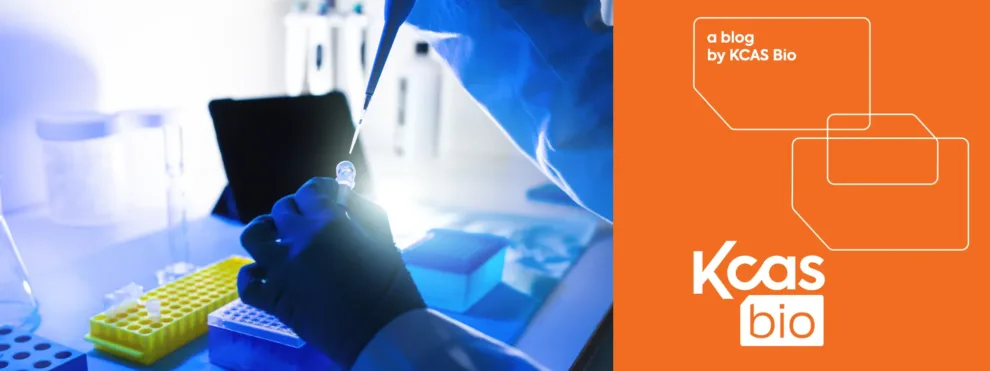Polymerase chain reaction (PCR) assays (including digital PCR and quantitative PCR) can be used to detect and measure nucleic acids such as DNA, RNA, small RNAs, and non-coding RNAs. What may be surprising is how few guidelines and whitepapers are available for bioanalytical support for regulated Bioanalysis by dPCR and qPCR. We at KCAS Bio equate the current regulatory landscape for bioanalysis by dPCR/qPCR to LBA bioanalysis circa 2000 or LCMS bioanalysis circa 1990.
In this overview, we’ll address: (1) why quantitative PCR assays for support of bioanalysis studies play such a critical role in drug development, and (2) how KCAS Bio navigates some of the challenges that come with these technologies.
Why the ‘Sudden’ Demand for Bioanalytical PCR?
The explosion in gene, cell, and RNA therapies in recent years has directly resulted in an increase in the number of PCR-based assays utilized for bioanalysis. As of this year, there are over 4,000 gene, cell, or RNA therapies in various stages of development. With the advancement of these novel therapeutics, there has been an increased utilization of PCR to assess their biodistribution, kinetics (TK/PK), and Biomarkers (PD). For gene therapies and cell-based gene therapies, PCR assays are often used to quantify the distribution of therapeutic to the desired target matrix/tissue to test the efficacy and track the distribution of the therapeutic to off-target matrix/tissue to measure safety. For example, viral vectors are commonly used for gene therapies and quantitative PCR assays are one gold standard technology for measuring the biodistribution of the viral vector on target and off target. In addition to the demand to measure the gene therapy test article by PCR, the desired mechanism of action of gene therapy is often to insert a transgene. Typically, a PCR assay is required to measure the transgene expression with RT-qPCR/RT-ddPCR.
Limited Guidance Presents Unique Challenges for Development and Validation
One of the biggest challenges faced industry-wide with utilizing PCR assays for bioanalyses is the limited guidance on how an assay should perform. Regulatory agencies often recommend using PCR as a bioanalytical method but provide a limited framework for developing and validating assays, including which parameters need to be validated.
Every PCR assay is going to be different, just like every cell or gene therapy is going to be different. These details determine the parameters of an assay that needs to be validated. Putting those differences aside, when you start to develop a PCR assay, they are, bioanalytically speaking, very fast methods to perform in the lab that generate large amounts of data very quickly. The analysis and quality review of this data presents another challenge. Limited tools are available to quickly and effectively analyze the data generated from PCR runs. Existing platforms require significant manual intervention and tabulation; therefore, they are prone to potential human error. Because of this potential for error, data analysis requires extensive quality control and quality assurance review to protect the integrity of the data.
Working Collaboratively to Create an Industry-wide Standard
With limited guidelines from regulatory agencies on assay development and validation, it’s important to know what recommendations are being used by a company when choosing a CRO partner. KCAS Bio follows the recommendations set out by the American Association of Pharmaceutical Scientists (AAPS) in their recent manuscript. Click here to access the manuscript and learn more about the AAPS recommendations.
The manuscript outlines the parameters to be considered when developing a PCR-based assay when validating the assay, as well as provides general acceptance criteria for assay validation. These new, robust recommendations were based on a combination of past publications’ positions in addition to the expanded recommendations gathered from previous industry working groups.
One Innovative Way to Keep up with These Challenges
KCAS Bio has recently developed a PCR data analysis module that will take data directly from the PCR instrument and automatically export it into the module, then provide automated regression of the data, automated assessment for acceptance criteria, and automated data output tables within minutes (click here to learn more). KCAS Bio, in collaboration with BioData Solutions, developed this module for drug development bioanalytical needs to provide better quality and quicker turnaround times. This type of innovative software/AI is helping advance the field of bioanalysis, with the most immediate impact being to help solve problems with data analysis for PCR-based assays and large multiplex panels. Every second counts and these types of innovations will ensure lifesaving and life-changing drugs get to the market quicker to support global health.
Reach out to KCAS Bio
To learn more about the unique expertise that KCAS Bio brings to their PCR-based assays for bioanalysis, or to discuss any of your bioanalysis needs, reach out today!

